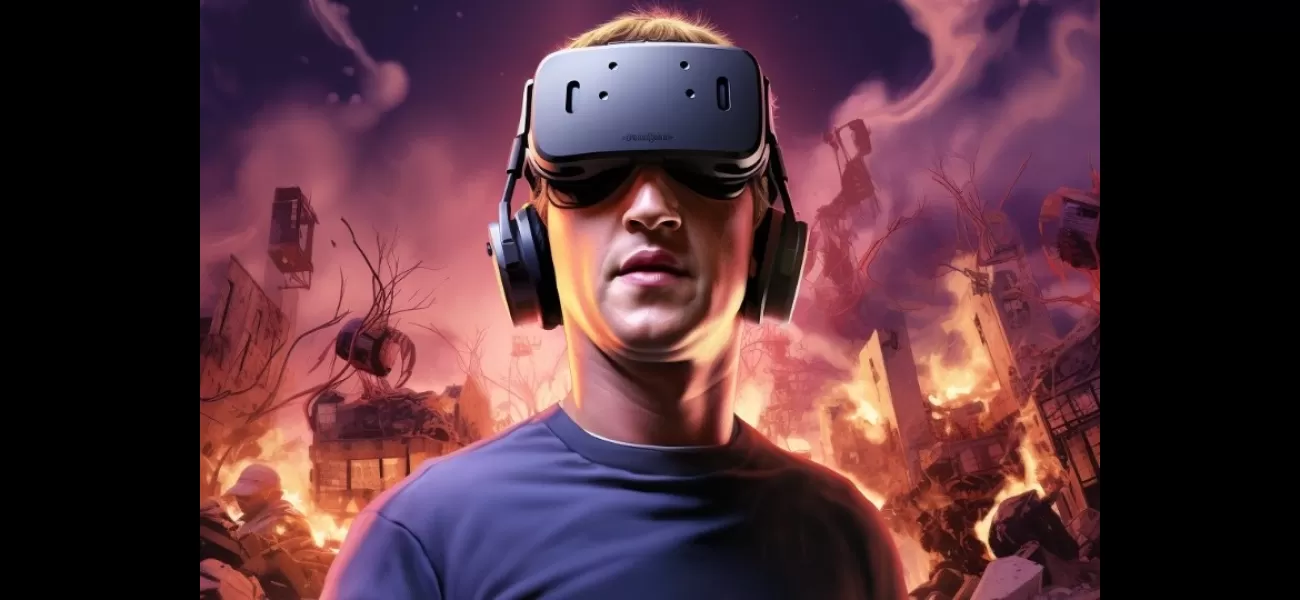Zuckerberg's $100B+ plan to create a shared virtual world is too risky to invest in.
Zuckerberg plans to invest $100B+ in the Metaverse, but the author isn't convinced. They explain why in a blog post.
November 24th 2023.

In 2014, Mark Zuckerberg made an ambitious move - he bought Oculus Rift for $2 billion, kick-starting his vision project for a virtual reality world which he called the "Metaverse". His vision was to create a world for people to "connect, work, play, learn, and shop" in. Since this initial investment, he has doubled down and even rebranded Facebook’s brand name to “Meta”. He is set to spend over $100 billion to make his mission happen in the next decade. Last year, Reality Labs lost $21 billion.
Where did the term "metaverse" come from? The term was first used by American sci-fi writer Neal Stephenson in his 1992 book Snow Crash. In the novel, he paints a dystopian vision of the future, where the rich escape into an alternative 3D connected reality. This virtual realm starts out as a single 65,536 km road that circles an artificial globe, and expands as people buy, build and renovate virtual real estate. It is a single world that everyone connects through.
Not everyone is convinced that the dream of a virtual world is the way to go. Brad Gerstner of the VC fund Altimeter wrote an open letter, calling the $100+ Billion bet on the metaverse “super-sized and terrifying”. He is worried that Meta is taking a highly profitable company into a loss making venture.
The investment is in two main components - the headsets and the ecosystem to use them. They are both necessary for the "Metaverse" to work. The hardware to use it, and the virtual world to play in. But how are they doing?
The sales of the headsets are not doing well. According to Forbes, in 2022 the sales of VR headsets were down 12% from the previous year. The area where headsets are selling is in the gaming industry, but it’s a big ask to transform that niche into general market adoption.
Horizon World, created by Meta, has only signed up 300,000 users so far, which is less than .007% of their total audience. Not a great conversion rate. Many of these users are not online at any one time, leaving the virtual world as a deserted, buggy and lonely place.
I am not sure that a full immersion into a virtual world is good for us. The social media world was an experiment that started off well, but has descended into a commercial cesspool that is driven by raw capitalism. Making money at any cost and damaging society. The Cambridge Analytica fiasco showed that Facebook was willing to sell your privacy to the highest bidder, and Meta’s Instagram has been linked to depression, anxiety and insomnia in children.
So why am I not signing up to play in Zuckerberg’s Metaverse? I don't want to wear a heavy isolating headset, sit in a dark room on my own, trust Meta's algorithms, or be bombarded with ads. I don't want more isolation, but more connection. Quality human relationships don't come through more technology.
The trending of the Metaverse project is not looking good. Declining headset sales and the virtual Horizons World are struggling to provide an environment or community that people want to come back to or even sign up to. Apple has also announced their Apple Vision Pro headset, and if anyone can succeed it would be them. But with any startup, success is all about timing - just look at Google Glass, which folded in 2015 after being touted as the next big thing.
The reality is that the metaverse is already here and it sits in our pockets or bags - our smartphones. We have enough trouble managing that obsession, and being dragged into a parallel universe that isolates us and tries to replace the physical with virtual will only make things worse. It's time to stop scrolling, get back to listening to each other, being aware and being present.
Where did the term "metaverse" come from? The term was first used by American sci-fi writer Neal Stephenson in his 1992 book Snow Crash. In the novel, he paints a dystopian vision of the future, where the rich escape into an alternative 3D connected reality. This virtual realm starts out as a single 65,536 km road that circles an artificial globe, and expands as people buy, build and renovate virtual real estate. It is a single world that everyone connects through.
Not everyone is convinced that the dream of a virtual world is the way to go. Brad Gerstner of the VC fund Altimeter wrote an open letter, calling the $100+ Billion bet on the metaverse “super-sized and terrifying”. He is worried that Meta is taking a highly profitable company into a loss making venture.
The investment is in two main components - the headsets and the ecosystem to use them. They are both necessary for the "Metaverse" to work. The hardware to use it, and the virtual world to play in. But how are they doing?
The sales of the headsets are not doing well. According to Forbes, in 2022 the sales of VR headsets were down 12% from the previous year. The area where headsets are selling is in the gaming industry, but it’s a big ask to transform that niche into general market adoption.
Horizon World, created by Meta, has only signed up 300,000 users so far, which is less than .007% of their total audience. Not a great conversion rate. Many of these users are not online at any one time, leaving the virtual world as a deserted, buggy and lonely place.
I am not sure that a full immersion into a virtual world is good for us. The social media world was an experiment that started off well, but has descended into a commercial cesspool that is driven by raw capitalism. Making money at any cost and damaging society. The Cambridge Analytica fiasco showed that Facebook was willing to sell your privacy to the highest bidder, and Meta’s Instagram has been linked to depression, anxiety and insomnia in children.
So why am I not signing up to play in Zuckerberg’s Metaverse? I don't want to wear a heavy isolating headset, sit in a dark room on my own, trust Meta's algorithms, or be bombarded with ads. I don't want more isolation, but more connection. Quality human relationships don't come through more technology.
The trending of the Metaverse project is not looking good. Declining headset sales and the virtual Horizons World are struggling to provide an environment or community that people want to come back to or even sign up to. Apple has also announced their Apple Vision Pro headset, and if anyone can succeed it would be them. But with any startup, success is all about timing - just look at Google Glass, which folded in 2015 after being touted as the next big thing.
The reality is that the metaverse is already here and it sits in our pockets or bags - our smartphones. We have enough trouble managing that obsession, and being dragged into a parallel universe that isolates us and tries to replace the physical with virtual will only make things worse. It's time to stop scrolling, get back to listening to each other, being aware and being present.
[This article has been trending online recently and has been generated with AI. Your feed is customized.]
[Generative AI is experimental.]
0
0
Submit Comment





